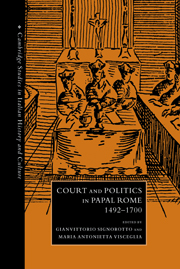Book contents
- Frontmatter
- Contents
- List of abbreviations
- Introduction
- 1 A turning-point in the history of the factional system in the Sacred College: the power of pope and cardinals in the age of Alexander VI
- 2 Court and city in the ceremony of the possesso in the sixteenth century
- 3 ‘Rome, workshop of all the practices of the world’: from the letters of Cardinal Ferdinando de' Medici to Cosimo I and Francesco I
- 4 The ‘world's theatre’: the court of Rome and politics in the first half of the seventeenth century
- 5 Factions in the Sacred College in the sixteenth and seventeenth centuries
- 6 The Secretariat of State as the pope's special ministry
- 7 The cardinal-protectors of the crowns in the Roman curia during the first half of the seventeenth century: the case of France
- 8 The squadrone volante: ‘independent’ cardinals and European politics in the second half of the seventeenth century
- 9 Roman avvisi: information and politics in the seventeenth century
- 10 Hegemony over the social scene and zealous popes (1676–1700)
- Index
- CAMBRIDGE STUDIES IN ITALIAN HISTORY AND CULTURE
6 - The Secretariat of State as the pope's special ministry
Published online by Cambridge University Press: 09 July 2009
- Frontmatter
- Contents
- List of abbreviations
- Introduction
- 1 A turning-point in the history of the factional system in the Sacred College: the power of pope and cardinals in the age of Alexander VI
- 2 Court and city in the ceremony of the possesso in the sixteenth century
- 3 ‘Rome, workshop of all the practices of the world’: from the letters of Cardinal Ferdinando de' Medici to Cosimo I and Francesco I
- 4 The ‘world's theatre’: the court of Rome and politics in the first half of the seventeenth century
- 5 Factions in the Sacred College in the sixteenth and seventeenth centuries
- 6 The Secretariat of State as the pope's special ministry
- 7 The cardinal-protectors of the crowns in the Roman curia during the first half of the seventeenth century: the case of France
- 8 The squadrone volante: ‘independent’ cardinals and European politics in the second half of the seventeenth century
- 9 Roman avvisi: information and politics in the seventeenth century
- 10 Hegemony over the social scene and zealous popes (1676–1700)
- Index
- CAMBRIDGE STUDIES IN ITALIAN HISTORY AND CULTURE
Summary
methodological problems
Scholars who have tried to work their way through the intricate web of relationships that characterized the Roman curia at different times in its history have often been faced with a complex situation because historians dealing with the several agencies that made up the curia have often tended to assess each agency independently from the rest, as though it were isolated from the general context. One example will suffice to illustrate this point. Madelaine Laurain-Portemer, in her work (which is of considerable importance) on the cardinal-nephew superintendent of the ecclesiastical state, confines her attention to that office and thus ends by neglecting all the other curial offices (notably the Secretariat of State). It is remarkable how many studies on the Roman curia insist on the competition between the various offices and dwell on the overwhelming power of one over the rest rather than on the balance between them – as though this latter approach were out of the question, and the very life of government agencies were not normally (and, for obvious reasons, necessarily) based on some form of equilibrium.
This approach has produced a strong tendency toward the fragmentation of research and has influenced the latter in the way I have just described, focusing attention on one specific aspect while neglecting others, or promoting studies (some of them quite significant) on broader topics, but above all on individual pontificates.
- Type
- Chapter
- Information
- Court and Politics in Papal Rome, 1492–1700 , pp. 132 - 157Publisher: Cambridge University PressPrint publication year: 2002



